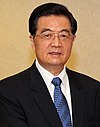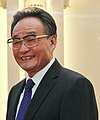2009 National People's Congress
| 2009 National People's Congress 第十一届全国人民代表大会第二次会议 Dì-shíyī Jiè Quánguó Rénmín Dàibiǎo Dàhuì Dì-èrcì Huìyì 2nd Plenary Session 12th National People's Congress 5 March – 13 March |
||||||||
|---|---|---|---|---|---|---|---|---|
|
|
||||||||
| President | Premier | Congress Chairman | ||||||
 |
 |
 |
||||||
| Hu Jintao | Wen Jiabao | Wu Bangguo | ||||||
| since 15 March 2003 |
since 16 March 2003 |
since 15 March 2003 |
||||||
|
|
||||||||
|
|
||||||||
|
|
||||||||
|
|
||||||||
|
||||||||
The 2nd Plenary Session of the 11th National People's Congress is the annual meeting of the highest legislative body of the People's Republic of China, which was held in March 2009 at the Great Hall of the People in Beijing. The event began on March 5 and lasted until March 13. The Congress was followed closely because of the possible impact any policy changes would have on the Chinese and world economy. Major issues discussed at the Congress include the global financial crisis, industrial revitalization, curbing unemployment, and social welfare.
Highlights of the Congress included Premier Wen Jiabao's expression of confidence in the growth of China's economy in 2009, conciliatory remarks towards Taiwan from Beijing, NPC Chairman Wu Bangguo's reiteration that China will not adopt Western-style democracy, and Wen's expressed doubts about U.S. treasury securities. The main issues raised by delegates included a strategy to adopt to face the current economic slowdown, the ways to continue to improve population's life standards (jobs, health), and continue efforts against corruption.
The 2009 NPC takes place alongside the 2009 session of the Chinese People's Political Consultative Conference (CPPCC), a political advisory body with little practical power. In recent years, however, there has been a marked rise in the amount of debate within both bodies. This year's congress is especially important because it takes place in the backdrop of the ongoing global financial crisis, the first such crisis of this proportion China has faced since economic liberalization under Deng Xiaoping in 1978. A day prior to the Congress, the government announced a 14.9% increase in the Chinese defense budget, 3% less than the previous year. There was also speculation of the unveiling of another stimulus package, which affected trading on global stock markets on March 4. The event's timeline was shortened this year because of the ongoing global financial crisis.
...
Wikipedia
